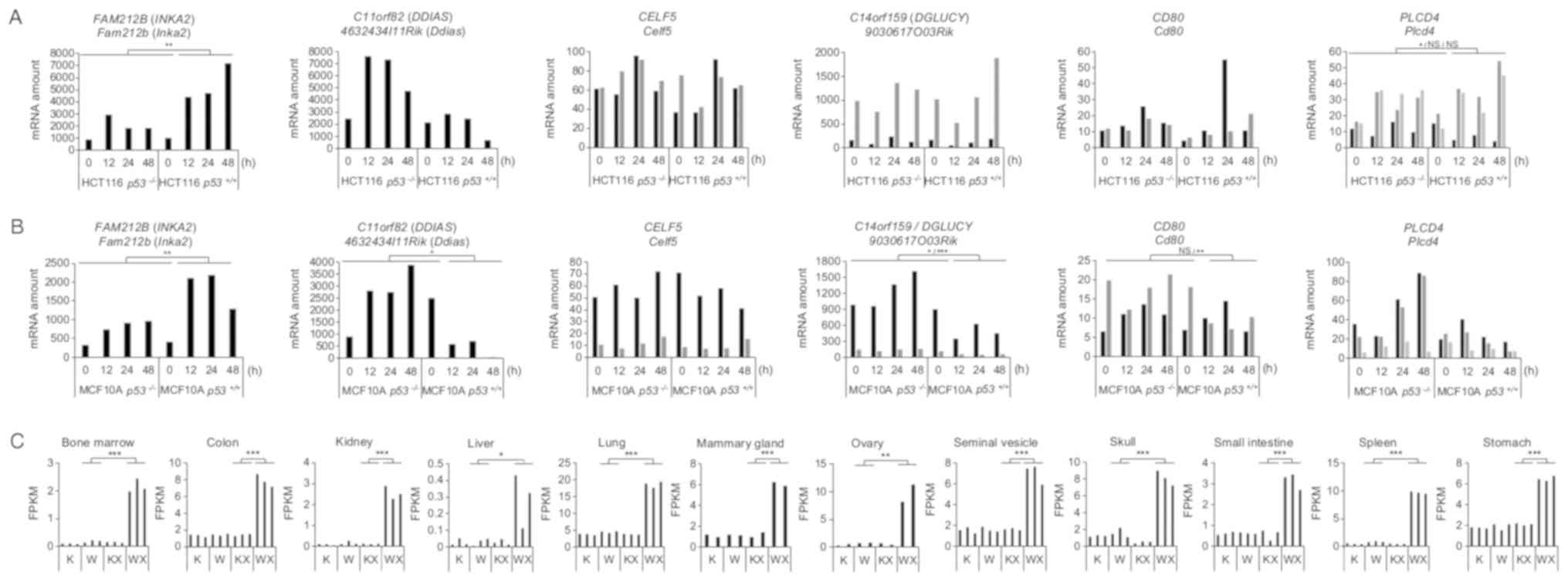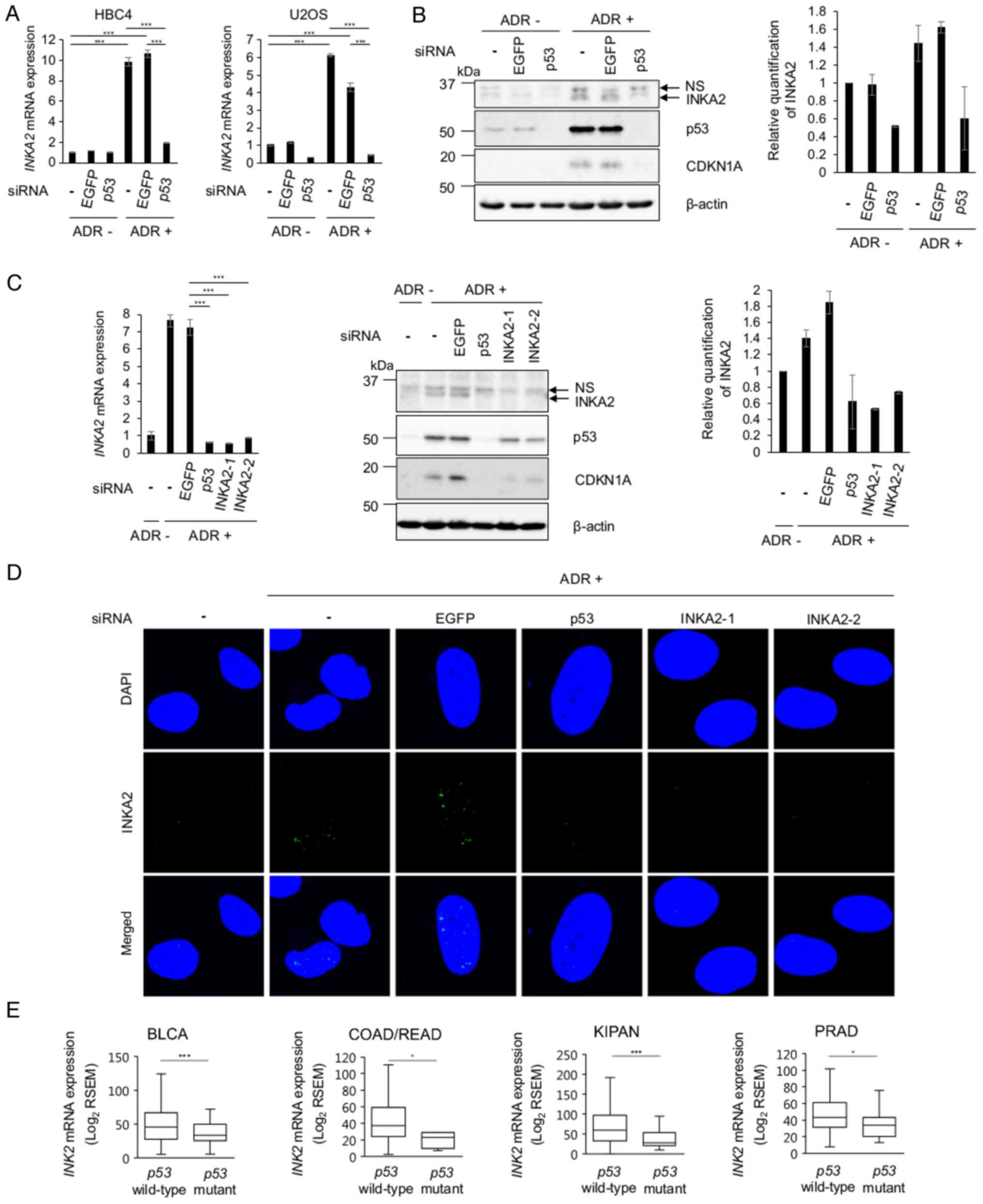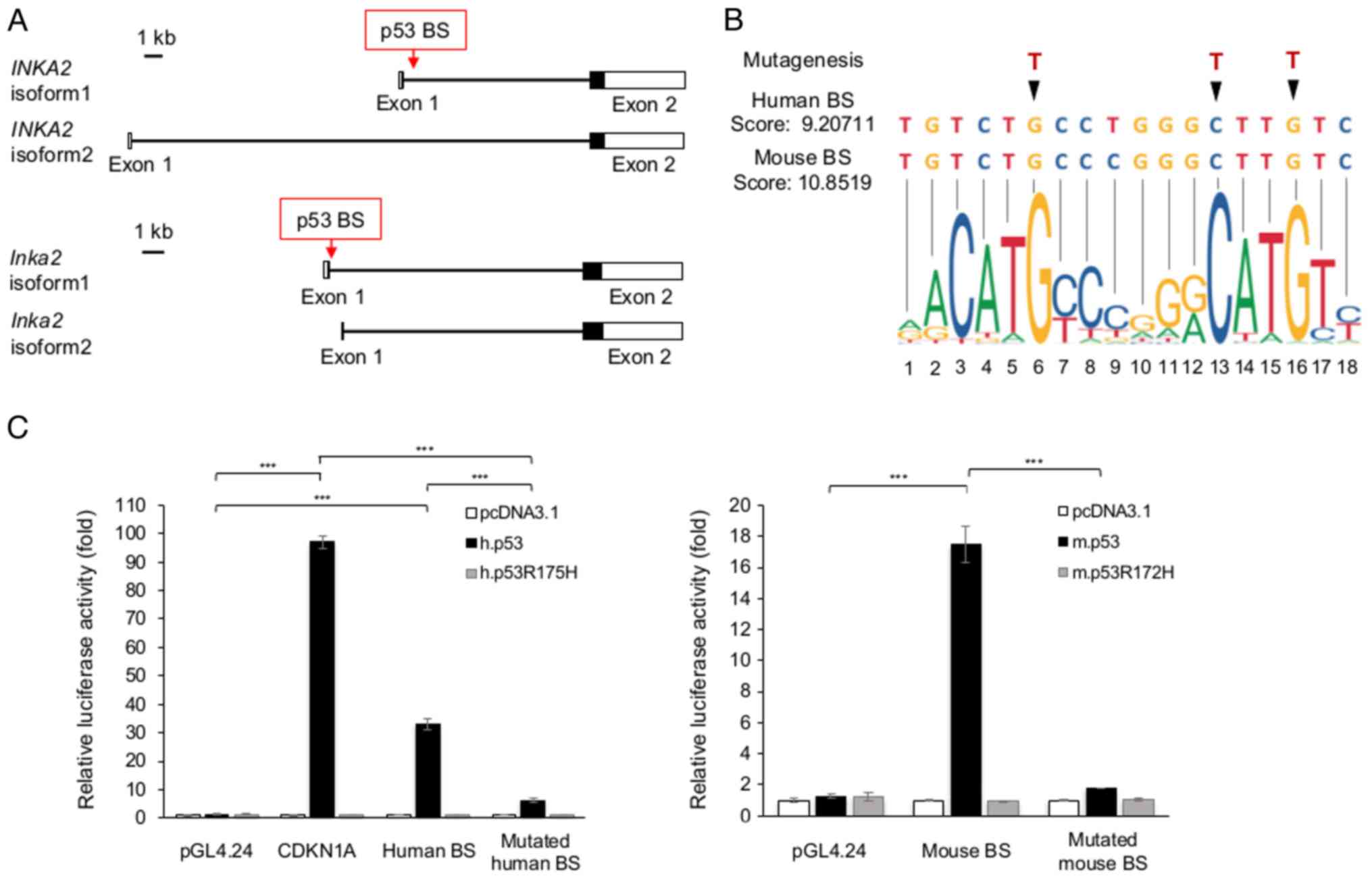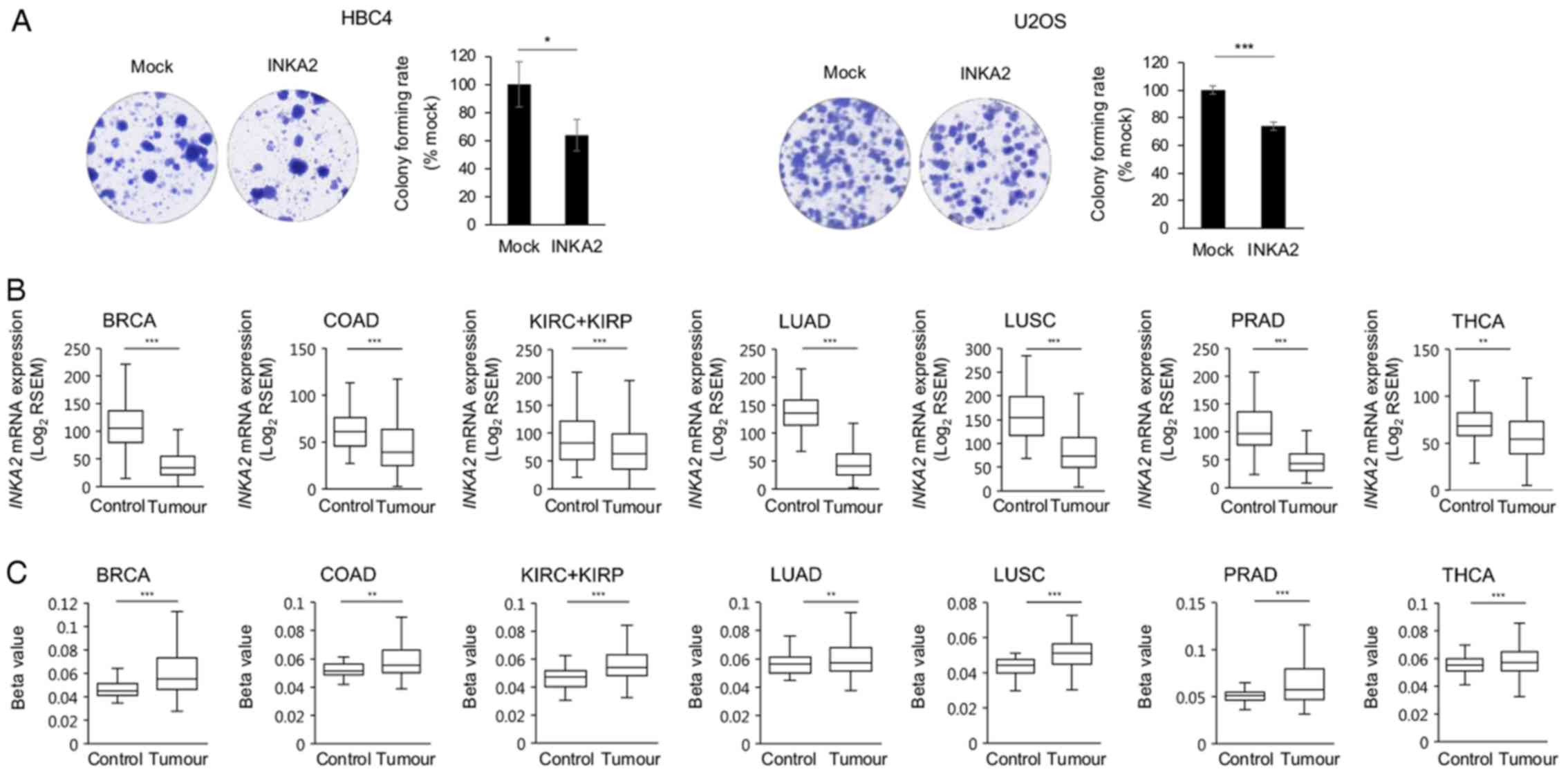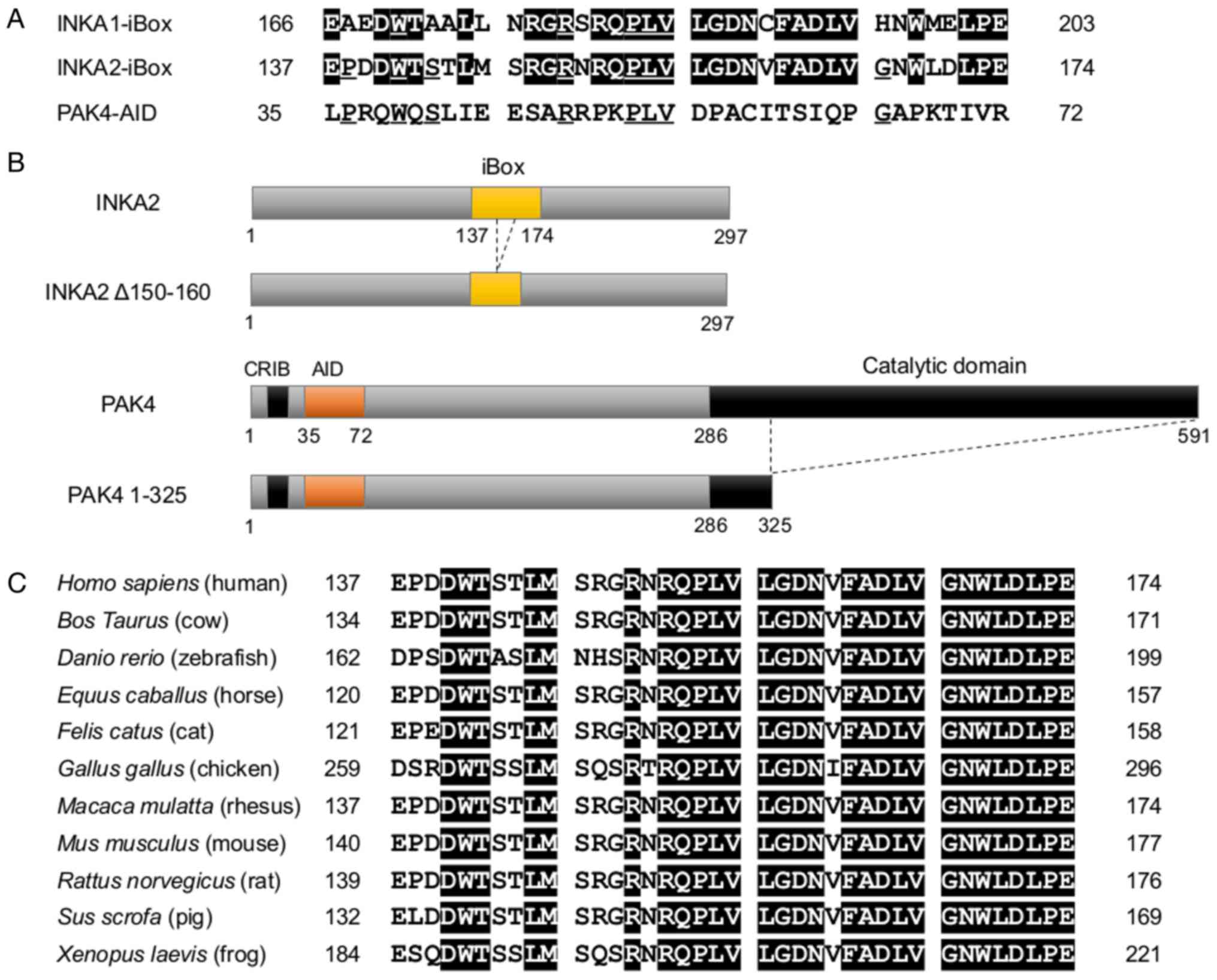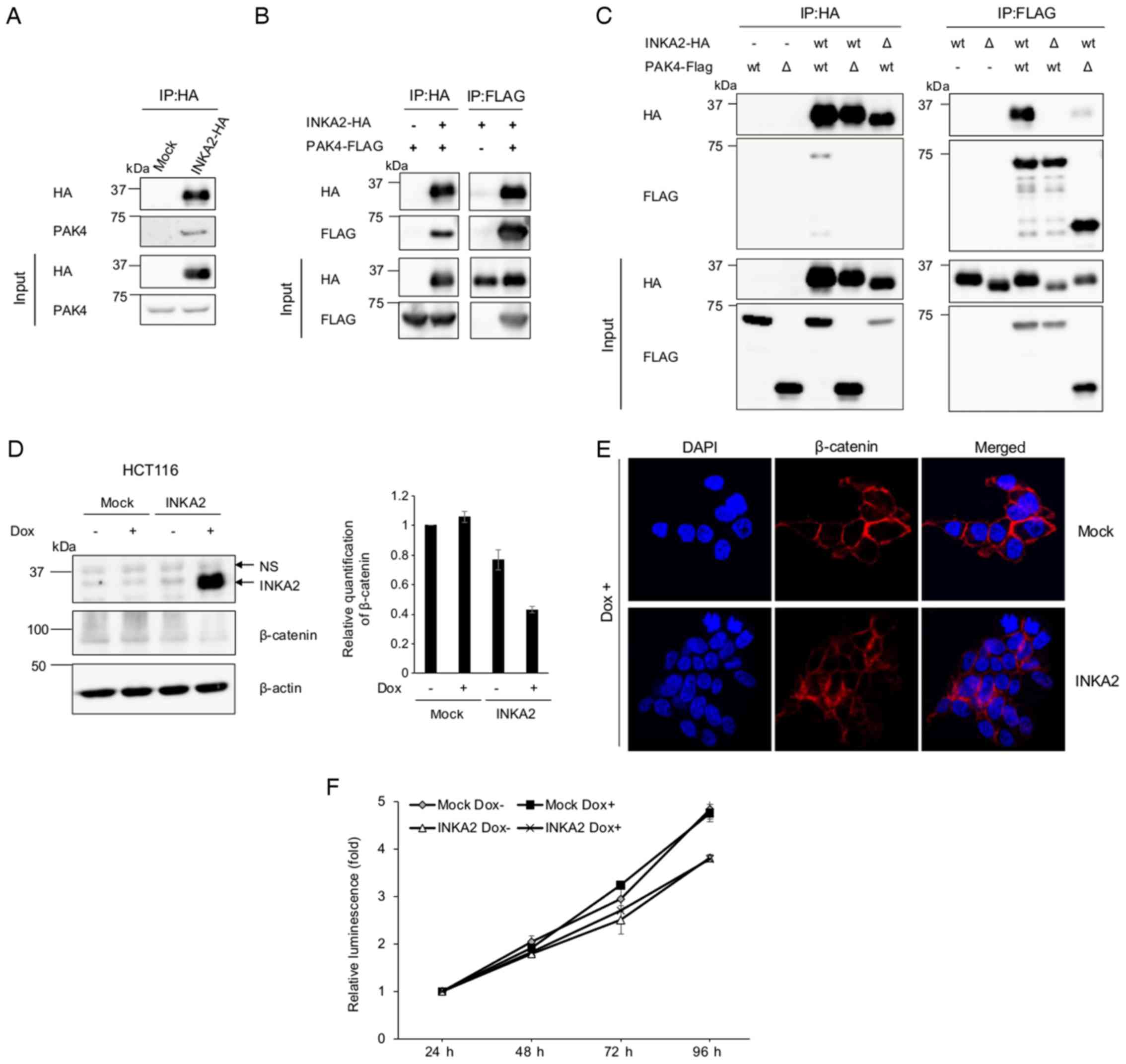|
1
|
Vogelstein B, Lane D and Levine AJ:
Surfing the p53 network. Nature. 408:307–310. 2000. View Article : Google Scholar : PubMed/NCBI
|
|
2
|
el-Deiry WS, Tokino T, Velculescu VE, Levy
DB, Parsons R, Trent JM, Lin D, Mercer WE, Kinzler KW and
Vogelstein B: WAF1, a potential mediator of p53 tumor suppression.
Cell. 75:817–825. 1993. View Article : Google Scholar : PubMed/NCBI
|
|
3
|
Bunz F, Dutriaux A, Lengauer C, Waldman T,
Zhou S, Brown JP, Sedivy JM, Kinzler KW and Vogelstein B:
Requirement for p53 and p21 to sustain G2 arrest after DNA damage.
Science. 282:1497–1501. 1998. View Article : Google Scholar : PubMed/NCBI
|
|
4
|
el-Deiry WS, Harper JW, O’Connor PM,
Velculescu VE, Canman CE, Jackman J, Pietenpol JA, Burrell M, Hill
DE, Wang Y, et al: WAF1/CIP1 is induced in p53-mediated G1 arrest
and apoptosis. Cancer Res. 54:1169–1174. 1994.PubMed/NCBI
|
|
5
|
Attardi LD, de Vries A and Jacks T:
Activation of the p53-dependent G1 checkpoint response in mouse
embryo fibroblasts depends on the specific DNA damage inducer.
Oncogene. 23:973–980. 2004. View Article : Google Scholar : PubMed/NCBI
|
|
6
|
He G, Siddik ZH, Huang Z, Wang R, Koomen
J, Kobayashi R, Khokhar AR and Kuang J: Induction of p21 by p53
following DNA damage inhibits both Cdk4 and Cdk2 activities.
Oncogene. 24:2929–2943. 2005. View Article : Google Scholar : PubMed/NCBI
|
|
7
|
Garner E and Raj K: Protective mechanisms
of p53-p21-pRb proteins against DNA damage-induced cell death. Cell
Cycle. 7:277–282. 2008. View Article : Google Scholar : PubMed/NCBI
|
|
8
|
Xu J and Morris GF: p53-mediated
regulation of proliferating cell nuclear antigen expression in
cells exposed to ionizing radiation. Mol Cell Biol. 19:12–20. 1999.
View Article : Google Scholar
|
|
9
|
Grombacher T, Eichhorn U and Kaina B: p53
is involved in regulation of the DNA repair gene
O6-methylguanine-DNA methyltransferase (MGMT) by DNA damaging
agents. Oncogene. 17:845–851. 1998. View Article : Google Scholar : PubMed/NCBI
|
|
10
|
Laptenko O and Prives C: Transcriptional
regulation by p53: One protein, many possibilities. Cell Death
Differ. 13:951–961. 2006. View Article : Google Scholar : PubMed/NCBI
|
|
11
|
Tanikawa C, Zhang YZ, Yamamoto R, Tsuda Y,
Tanaka M, Funauchi Y, Mori J, Imoto S, Yamaguchi R, Nakamura Y, et
al: The transcriptional landscape of p53 signalling pathway.
EBioMedicine. 20:109–119. 2017. View Article : Google Scholar : PubMed/NCBI
|
|
12
|
Miyamoto T, Tanikawa C, Yodsurang V, Zhang
YZ, Imoto S, Yamaguchi R, Miyano S, Nakagawa H and Matsuda K:
Identification of a p53-repressed gene module in breast cancer
cells. Oncotarget. 8:55821–55836. 2017. View Article : Google Scholar : PubMed/NCBI
|
|
13
|
Koguchi T, Tanikawa C, Mori J, Kojima Y
and Matsuda K: Regulation of myoinositol biosynthesis by p53-ISYNA1
pathway. Int J Oncol. 48:2415–2424. 2016. View Article : Google Scholar : PubMed/NCBI
|
|
14
|
Yodsurang V, Tanikawa C, Miyamoto T, Lo
PHY, Hirata M and Matsuda K: Identification of a novel p53 target,
COL17A1, that inhibits breast cancer cell migration and invasion.
Oncotarget. 8:55790–55803. 2017. View Article : Google Scholar : PubMed/NCBI
|
|
15
|
Chèneby J, Gheorghe M, Artufel M,
Mathelier A and Ballester B: ReMap 2018: An updated atlas of
regulatory regions from an integrative analysis of DNA-binding
ChIP-seq experiments. Nucleic Acids Res. 46:D267–D275. 2018.
View Article : Google Scholar :
|
|
16
|
Zhou KR, Liu S, Sun WJ, Zheng LL, Zhou H,
Yang JH and Qu LH: ChIPBase v2.0: Decoding transcriptional
regulatory networks of non-coding RNAs and protein-coding genes
from ChIP-seq data. Nucleic Acids Res. 45:D43–D50. 2017. View Article : Google Scholar :
|
|
17
|
Khan A, Fornes O, Stigliani A, Gheorghe M,
Castro-Mondragon JA, van der Lee R, Bessy A, Chèneby J, Kulkarni
SR, Tan G, et al: JASPAR 2018: Update of the open-access database
of transcription factor binding profiles and its web framework.
Nucleic Acids Res. 46:D260–D266. 2018. View Article : Google Scholar :
|
|
18
|
Wei CL, Wu Q, Vega VB, Chiu KP, Ng P,
Zhang T, Shahab A, Yong HC, Fu Y, Weng Z, et al: A global map of
p53 transcription-factor binding sites in the human genome. Cell.
124:207–219. 2006. View Article : Google Scholar : PubMed/NCBI
|
|
19
|
el-Deiry WS, Tokino T, Waldman T, Oliner
JD, Velculescu VE, Burrell M, Hill DE, Healy E, Rees JL, Hamilton
SR, et al: Topological control of p21WAF1/CIP1 expression in normal
and neoplastic tissues. Cancer Res. 55:2910–2919. 1995.PubMed/NCBI
|
|
20
|
Schneider CA, Rasband WS and Eliceiri KW:
NIH Image to ImageJ: 25 years of image analysis. Nat Methods.
9:671–675. 2012. View Article : Google Scholar : PubMed/NCBI
|
|
21
|
Takahashi Y, Tanikawa C, Miyamoto T,
Hirata M, Wang G, Ueda K, Komatsu T and Matsuda K: Regulation of
tubular recycling endosome biogenesis by the p53-MICALL1 pathway.
Int J Oncol. 51:724–736. 2017. View Article : Google Scholar : PubMed/NCBI
|
|
22
|
Cerami E, Gao J, Dogrusoz U, Gross BE,
Sumer SO, Aksoy BA, Jacobsen A, Byrne CJ, Heuer ML, Larsson E, et
al: The cBio cancer genomics portal: An open platform for exploring
multidimensional cancer genomics data. Cancer Discov. 2:401–404.
2012. View Article : Google Scholar : PubMed/NCBI
|
|
23
|
Gao J, Aksoy BA, Dogrusoz U, Dresdner G,
Gross B, Sumer SO, Sun Y, Jacobsen A, Sinha R, Larsson E, et al:
Integrative analysis of complex cancer genomics and clinical
profiles using the cBio-Portal. Sci Signal. 6:pl12013. View Article : Google Scholar
|
|
24
|
Huang WY, Hsu SD, Huang HY, Sun YM, Chou
CH, Weng SL and Huang HD: MethHC: A database of DNA methylation and
gene expression in human cancer. Nucleic Acids Res. 43:D856–D861.
2015. View Article : Google Scholar :
|
|
25
|
Baxter EW and Milner J: p53 Regulates LIF
expression in human medulloblastoma cells. J Neurooncol.
97:373–382. 2010. View Article : Google Scholar
|
|
26
|
Budanov AV, Shoshani T, Faerman A, Zelin
E, Kamer I, Kalinski H, Gorodin S, Fishman A, Chajut A, Einat P, et
al: Identification of a novel stress-responsive gene Hi95 involved
in regulation of cell viability. Oncogene. 21:6017–6031. 2002.
View Article : Google Scholar : PubMed/NCBI
|
|
27
|
Quintens R, Verreet T, Janssen A, Neefs M,
Leysen L, Michaux A, Verslegers M, Samari N, Pani G, Verheyde J, et
al: Identification of novel radiation-induced p53-dependent
transcripts extensively regulated during mouse brain development.
Biol Open. 4:331–344. 2015. View Article : Google Scholar : PubMed/NCBI
|
|
28
|
Nakano K and Vousden KH: PUMA, a novel
proapoptotic gene, is induced by p53. Mol Cell. 7:683–694. 2001.
View Article : Google Scholar : PubMed/NCBI
|
|
29
|
Endo Y, Fujita T, Tamura K, Tsuruga H and
Nojima H: Structure and chromosomal assignment of the human cyclin
G gene. Genomics. 38:92–95. 1996. View Article : Google Scholar : PubMed/NCBI
|
|
30
|
Zhang Y, Shin SJ, Liu D, Ivanova E,
Foerster F, Ying H, Zheng H, Xiao Y, Chen Z, Protopopov A, et al:
ZNF365 promotes stability of fragile sites and telomeres. Cancer
Discov. 3:798–811. 2013. View Article : Google Scholar : PubMed/NCBI
|
|
31
|
Sung YH, Kim HJ, Devkota S, Roh J, Lee J,
Rhee K, Bahk YY and Lee HW: Pierce1, a novel p53 target gene
contributing to the ultraviolet-induced DNA damage response. Cancer
Res. 70:10454–10463. 2010. View Article : Google Scholar : PubMed/NCBI
|
|
32
|
Kawase T, Ohki R, Shibata T, Tsutsumi S,
Kamimura N, Inazawa J, Ohta T, Ichikawa H, Aburatani H, Tashiro F,
et al: PH domain-only protein PHLDA3 is a p53-regulated repressor
of Akt. Cell. 136:535–550. 2009. View Article : Google Scholar : PubMed/NCBI
|
|
33
|
Hsieh WJ, Hsieh SC, Chen CC and Wang FF:
Human DDA3 is an oncoprotein down-regulated by p53 and DNA damage.
Biochem Biophys Res Commun. 369:567–572. 2008. View Article : Google Scholar : PubMed/NCBI
|
|
34
|
Osada M, Park HL, Park MJ, Liu JW, Wu G,
Trink B and Sidransky D: A p53-type response element in the GDF15
promoter confers high specificity for p53 activation. Biochem
Biophys Res Commun. 354:913–918. 2007. View Article : Google Scholar : PubMed/NCBI
|
|
35
|
Tanikawa C, Furukawa Y, Yoshida N, Arakawa
H, Nakamura Y and Matsuda K: XEDAR as a putative colorectal tumor
suppressor that mediates p53-regulated anoikis pathway. Oncogene.
28:3081–3092. 2009. View Article : Google Scholar : PubMed/NCBI
|
|
36
|
Consortium EP; ENCODE Project Consortium:
An integrated encyclopedia of DNA elements in the human genome.
Nature. 489:57–74. 2012. View Article : Google Scholar : PubMed/NCBI
|
|
37
|
Kent WJ, Sugnet CW, Furey TS, Roskin KM,
Pringle TH, Zahler AM and Haussler D: The human genome browser at
UCSC. Genome Res. 12:996–1006. 2002. View Article : Google Scholar : PubMed/NCBI
|
|
38
|
Baskaran Y, Ang KC, Anekal PV, Chan WL,
Grimes JM, Manser E and Robinson RC: An in cellulo-derived
structure of PAK4 in complex with its inhibitor Inka1. Nat Commun.
6:86812015. View Article : Google Scholar : PubMed/NCBI
|
|
39
|
Ha BH, Davis MJ, Chen C, Lou HJ, Gao J,
Zhang R, Krauthammer M, Halaban R, Schlessinger J, Turk BE, et al:
Type II p21-activated kinases (PAKs) are regulated by an
autoinhibitory pseudosubstrate. Proc Natl Acad Sci USA.
109:16107–16112. 2012. View Article : Google Scholar : PubMed/NCBI
|
|
40
|
Wang W, Lim L, Baskaran Y, Manser E and
Song J: NMR binding and crystal structure reveal that
intrinsically-unstructured regulatory domain auto-inhibits PAK4 by
a mechanism different from that of PAK1. Biochem Biophys Res
Commun. 438:169–174. 2013. View Article : Google Scholar : PubMed/NCBI
|
|
41
|
Li Y, Shao Y, Tong Y, Shen T, Zhang J, Li
Y, Gu H and Li F: Nucleo-cytoplasmic shuttling of PAK4 modulates
β-catenin intracellular translocation and signaling. Biochim
Biophys Acta. 1823:465–475. 2012. View Article : Google Scholar
|
|
42
|
Luo T, Xu Y, Hoffman TL, Zhang T,
Schilling T and Sargent TD: Inca: A novel p21-activated
kinase-associated protein required for cranial neural crest
development. Development. 134:1279–1289. 2007. View Article : Google Scholar : PubMed/NCBI
|
|
43
|
Reid BS, Sargent TD and Williams T:
Generation and characterization of a novel neural crest marker
allele, Inka1-LacZ, reveals a role for Inka1 in mouse neural tube
closure. Dev Dyn. 239:1188–1196. 2010. View Article : Google Scholar : PubMed/NCBI
|
|
44
|
Iwasaki Y, Yumoto T and Sakakibara S:
Expression profiles of inka2 in the murine nervous system. Gene
Expr Patterns. 19:83–97. 2015. View Article : Google Scholar : PubMed/NCBI
|
|
45
|
Debebe A, Medina V, Chen CY, Mahajan IM,
Jia C, Fu D, He L, Zeng N, Stiles BW, Chen CL, et al: Wnt/β-catenin
activation and macrophage induction during liver cancer development
following steatosis. Oncogene. 36:6020–6029. 2017. View Article : Google Scholar : PubMed/NCBI
|
|
46
|
Lee K and A Piazza G: The interaction
between the Wnt/β-catenin signaling cascade and PKG activation in
cancer. J Biomed Res. 31:189–196. 2017.PubMed/NCBI
|
|
47
|
Chong PS, Zhou J, Chooi JY, Chan ZL, Toh
SH, Tan TZ, Wee S, Gunaratne J, Zeng Q and Chng WJ: Non-canonical
activation of beta-catenin by PRL-3 phosphatase in acute myeloid
leukemia. Oncogene. 38:1508–1519. 2018. View Article : Google Scholar
|
|
48
|
Sinnberg T, Menzel M, Ewerth D, Sauer B,
Schwarz M, Schaller M, Garbe C and Schittek B: β-Catenin signaling
increases during melanoma progression and promotes tumor cell
survival and chemoresistance. PLoS One. 6:e234292011. View Article : Google Scholar
|
|
49
|
Yang CM, Ji S, Li Y, Fu LY, Jiang T and
Meng FD: β-Catenin promotes cell proliferation, migration, and
invasion but induces apoptosis in renal cell carcinoma. OncoTargets
Ther. 10:711–724. 2017. View Article : Google Scholar
|
|
50
|
Zhang X, Zhang X, Li Y, Shao Y, Xiao J,
Zhu G and Li F: PAK4 regulates G6PD activity by p53 degradation
involving colon cancer cell growth. Cell Death Dis. 8:e28202017.
View Article : Google Scholar : PubMed/NCBI
|
|
51
|
He LF, Xu HW, Chen M, Xian ZR, Wen XF,
Chen MN, Du CW, Huang WH, Wu JD and Zhang GJ: Activated-PAK4
predicts worse prognosis in breast cancer and promotes
tumorigenesis through activation of PI3K/AKT signaling. Oncotarget.
8:17573–17585. 2017.PubMed/NCBI
|
|
52
|
Cai S, Ye Z, Wang X, Pan Y, Weng Y, Lao S,
Wei H and Li L: Overexpression of P21-activated kinase 4 is
associated with poor prognosis in non-small cell lung cancer and
promotes migration and invasion. J Exp Clin Cancer Res. 34:482015.
View Article : Google Scholar : PubMed/NCBI
|
|
53
|
Siu MK, Chan HY, Kong DS, Wong ES, Wong
OG, Ngan HY, Tam KF, Zhang H, Li Z, Chan QK, et al: p21-activated
kinase 4 regulates ovarian cancer cell proliferation, migration,
and invasion and contributes to poor prognosis in patients. Proc
Natl Acad Sci USA. 107:18622–18627. 2010. View Article : Google Scholar : PubMed/NCBI
|
|
54
|
Murray BW, Guo C, Piraino J, Westwick JK,
Zhang C, Lamerdin J, Dagostino E, Knighton D, Loi CM, Zager M, et
al: Small-molecule p21-activated kinase inhibitor PF-3758309 is a
potent inhibitor of oncogenic signaling and tumor growth. Proc Natl
Acad Sci USA. 107:9446–9451. 2010. View Article : Google Scholar : PubMed/NCBI
|
|
55
|
Fujimura N: WNT/β-catenin signaling in
vertebrate eye development. Front Cell Dev Biol. 4:1382016.
View Article : Google Scholar
|
|
56
|
Duan P and Bonewald LF: The role of the
wnt/β-catenin signaling pathway in formation and maintenance of
bone and teeth. Int J Biochem Cell Biol. 77:23–29. 2016. View Article : Google Scholar : PubMed/NCBI
|
|
57
|
Tamamura Y, Otani T, Kanatani N, Koyama E,
Kitagaki J, Komori T, Yamada Y, Costantini F, Wakisaka S, Pacifici
M, et al: Developmental regulation of Wnt/beta-catenin signals is
required for growth plate assembly, cartilage integrity, and
endochondral ossification. J Biol Chem. 280:19185–19195. 2005.
View Article : Google Scholar : PubMed/NCBI
|
|
58
|
Xu HT, Lai WL, Liu HF, Wong LL, Ng IO and
Ching YP: PAK4 phosphorylates p53 at serine 215 to promote liver
cancer metastasis. Cancer Res. 76:5732–5742. 2016. View Article : Google Scholar : PubMed/NCBI
|















